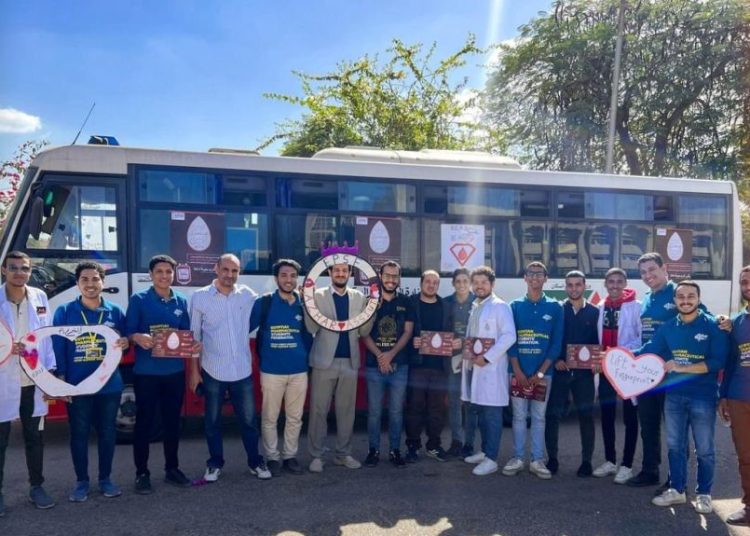One drop of blood equals a new life.
Such is the inspiration behind a new campaign for blood donors launched by the Egyptian Pharmaceutical Students’ Federation at Al-Azhar University in Assiout.
Thanks to the campaign, conducted under the supervision of vice president of Al-Azhar University Professor Mohamed Abdel Malik, more than 1,013 blood bags have been collected to help critical cases in governmental hospitals in Upper Egypt.
Ain Shams University in co-operation with the Shoryaan el-Attaa Association at the Faculty of Medicine organised a blood donor campaign for Palestinian brothers.
The university is hoping to raise community participation and in accordance with directives from President Abdel Fattah El Sisi provide urgent relief for Palestine.
Cairo University has been collaborating with the Ra’i Masr (Egypt’s Shepherd) Foundation to launch a blood donor campaign, which gained tremendous response from students and teaching staff.
According to the National Blood Transfusion Service Centre at the Ministry of Health, national blood donation does not meet patient needs nationwide as just 1 per cent of the population has given blood.
Paramedic Ahmed Ali of the Egyptian Ambulance Organisation said: “Giving blood is a noble act that can save lives.”
“We hope the government will launch more initiatives to donate blood to contribute to the betterment of society,” Ali told The Egyptian Gazette.
“Blood is one of the most important things that keep a person alive. Humans have between four and six litres of blood depending on sex and body structure,” Ali said.
“The need for blood includes everyone, but the availability of blood to those who need it does not include everyone. Low- and middle-income countries are particularly affected by severe blood shortages.
“To ensure that safe blood is available to everyone who needs a transfusion, all countries need voluntary, unpaid blood donors who give blood regularly,” Ali said.
Dr Hassan Tawfik, who is former head of the Health Insurance sector in Benha, told this paper: “Our dilemmas are increasing every day in the Arab countries from wars and terrorism. Lives are lost every day. Increasing awareness on blood donation should be our main concern now.”
“The role of non-governmental organisations (NGOs) is crucial in the spread of blood donation awareness. They should expand the reach of their campaigns by following international safety procedures in blood transfusion,” Tawfik said.
“Some choose not to give blood due to a previous bad experience of not finding blood for their families. Others are afraid that the process might be painful, or that the blood is infected. However, such fears are unfounded if procedures are followed carefully,” Tawfik added.
In his view, awareness is more likely to reach remote areas, away from major cities.
“In Cairo and Alexandria and other busy locations, people are less inclined to listen to anyone on the street talking about giving blood,” Tawfik said. “Our main goal is awareness, not collecting blood bags. The number of blood bags is only an awareness indicator.”
World Blood Day
World Blood Donor Day is held annually on June 14 to raise global awareness of the need for safe blood for transfusions, to highlight the vital contribution that voluntary and unpaid blood donors make to national health systems, and to support the national blood transfusion services, blood donor organisations and other NGOs to expand blood donor programmes by promoting national and local campaigns.
Blood products are an essential resource for the effective management of women with haemorrhage associated with pregnancy and childbirth, children with severe anemia caused by malaria and malnutrition, patients with blood and bone marrow disorders, hereditary haemoglobin disorders, and immune deficiencies, victims of trauma, emergencies, disasters, and accidents, and patients undergoing advanced surgery.
While a favourable social and cultural climate and strong solidarity facilitate the development of effective blood donation programmes, there is also widespread recognition that blood donation contributes to social bonding and communal unity.
How is donated blood used to help others?
Donated blood helps someone survive. The blood is not used as it is. It is first screened for diseases that can be transmitted through blood, for example, HIV or hepatitis.
Blood is made up of three main parts – cells, plasma and platelets, which can be used separately to treat blood-related disorders, anaemia, cancer, blood loss during childbirth and cardiac surgeries. It can also be used for research purposes and developing new treatments for blood-related ailments.
Before giving blood
Drink plenty of water and eat an adequate meal. Water keeps you hydrated and maintains bodily functions, thus averting the risk of low blood pressure. Experts say you should never give blood on an empty stomach.
After your donation, replenish your body’s nutrient store. Avoid strenuous physical activities like working out or running. Make sure you have a nutritious snack and plenty to aid recovery. Eat foods that are rich in iron, vitamins B and C to regenerate red blood cells. Replenishing your body’s fluid levels after giving blood is equally important.






Discussion about this post